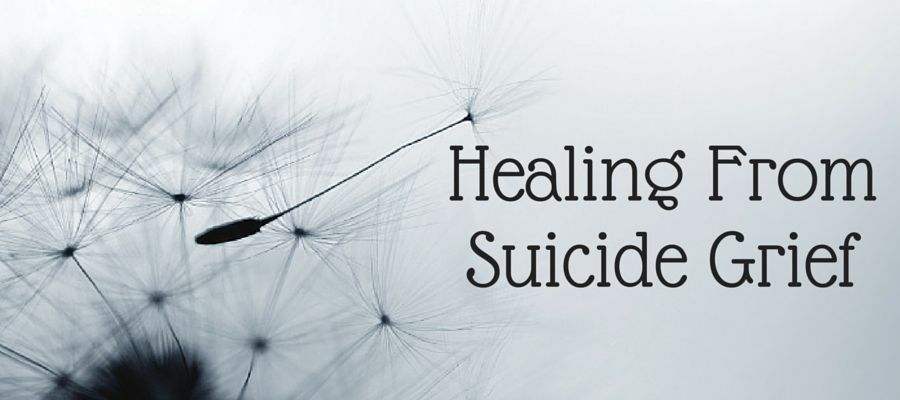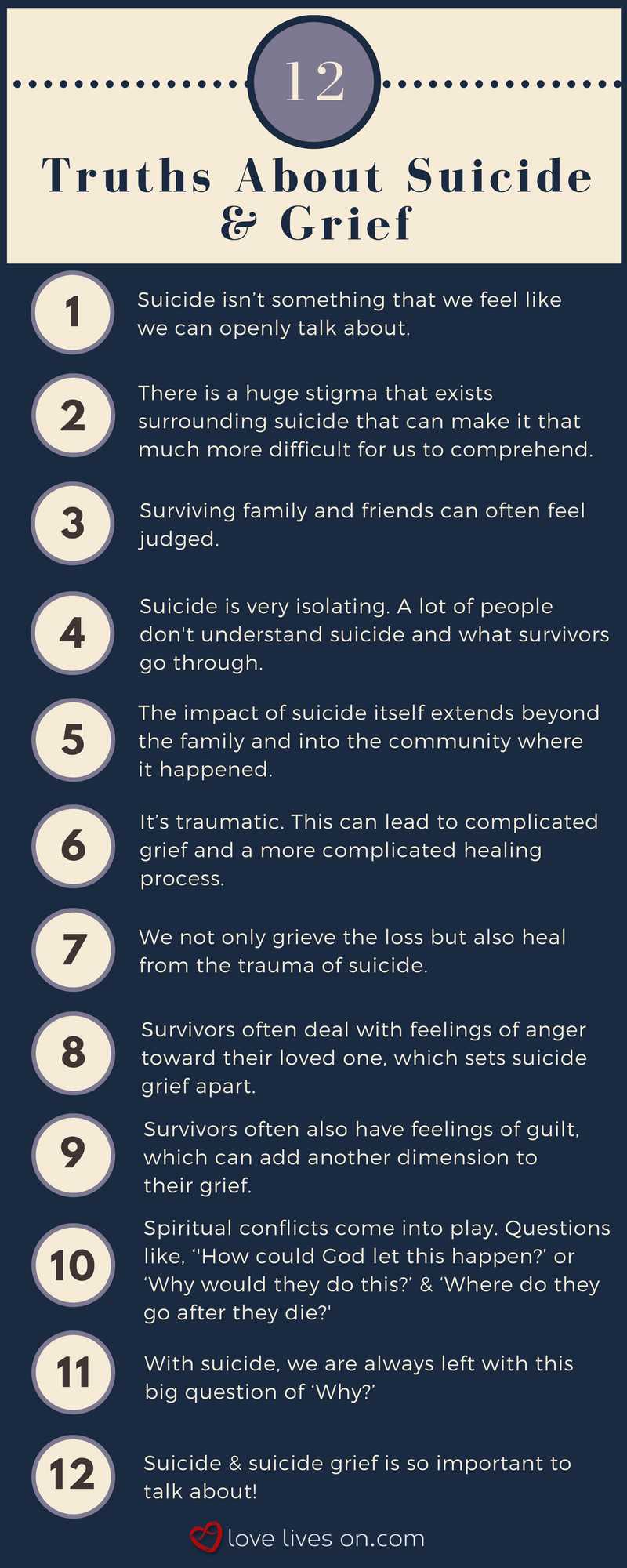
We sat down with Dr. Christina Hibbert to discuss the intense and complicated grief that we feel after someone we love has committed suicide, and the journey we must take in order to arrive at a place of ‘grateful loving joy’.
Not only is Dr. Hibbert a clinical psychologist with professional experience in supporting families affected by suicide, she has personally lost a close-friend to suicide, and her beloved sister.
Dr. Hibbert shared her “12 Secret Truths About Suicide Grief”with us that we have turned into a helpful infographic.
She has also chronicled her personal journey of loss, along with her clinical insights, in her book This is How We Grow. Her touching memoir has gone on to become a best-seller on Amazon.
Q: Can You Share Your Personal Story With Us?
“For our viewers who might not be familiar with your personal story, would you mind sharing a little bit about the loss of your dear sister, Shannon, and your close friend, Jody, to suicide?” asks interview host Courtney Murdock.
“My sister Shannon died in 2007, a few months after my brother-in-law [Shannon’s husband] had died of cancer,” explains Dr. Hibbert.
“It was one of those situations where the police call you and they won’t give you details about what has happened or what’s going on.”
“I got the call in the car on my way over to Shannon’s that she had passed away and that my husband and I had inherited her two sons as they had now lost both of their parents.”
“The official cause of Shannon’s death was an overdose of alcohol and acetaminophen.”
“Because of how she died, being drunk and taking Tylenol, it wasn’t clear if it was accidental or not.
“She didn’t take the whole bottle, but there was enough in her system to make police think it could have been suicide.
“Whatever it was, we had to wait for the autopsy to figure out what actually had happened. I think that she was drunk and just made a really bad mistake.
“Then fast forward a couple of years later, just after my book This Is How We Grow came out, my friend Jody dropped off her youngest child at my house, said goodbye to her sons and her husband, drove to the Grand Canyon and jumped to her death.
“Both Jody’s death and the death of my sister were obviously immensely traumatic, but just in terms of the way that Jody had died almost made me appreciate in some sense that my sister had been drinking when she died.
“Both were incredibly difficult to deal with in different ways.
“Suicide is always especially difficult to deal with as there are so many different additional aspects of death by suicide,” states Dr. Hibbert.
Q: Is the Grief that Follows a Suicide Different?
“You have also lost many other people in your family to illness, including a younger sister and brother-in-law to cancer,” says Murdock.
“From your personal experience, as well as from your clinical work, how is grief following a suicide different to grief following a death from illness, accident or crime?” asks Murdock.
“A lot of the grief is similar,” opinions Dr. Hibbert.
“And grief itself has over 100 symptoms, so my grief might look very different from someone else’s grief.”
“But, the extra elements that come of suicide that I think can make it really difficult is the nature of how they died, knowing that they died by their own hand.
“That element makes it that much more difficult to deal with because in any death, you might be angry.
“For example, if your loved one had cancer, you might find yourself angry about that. But it is easier to deal with in a way because it is completely out of your control.
“But with suicide, you find yourself feeling those feelings of anger toward your loved one and that can be really hard to process.
“With suicide, you have all of these questions like, “What could I have done?” or, “Why did you do that?”
“So there is this element of guilt or anger that goes along with it.
“Where in a ‘normal death’ where you might be angry that they died, you might be angry at God for example.
“Whereas in suicide, you often find yourself feeling angry toward your loved one.
“Another reason suicide can be more difficult to cope with is because often with suicides, it can be so traumatic, there is an element of trauma.
“Not every death or loss involves a major trauma.
“Every death can be a traumatic experience, especially if you were very close to the person who had died. But by it’s nature, suicide can be very traumatic,” explains Dr. Hibbert.
Q: What are the “12 Truths” About Suicide and Grief?
“In your blog you talk about the 12 truths about suicide, and the grief of family survivors. Can you explain what these 12 truths are?” asks Murdock.
“These 12 truths are something that I came up with just given my experiences and my clinical work as a psychologist,” replied Dr. Hibbert.
“So the 1st truth is that suicide isn’t something that we feel like we can openly talk about and this makes it very difficult.
“Family members often feel as though they can’t talk about how the person died.
“This makes it extremely difficult to cope with because it puts a strain on family members who feel as though they are trying to protect a family secret in a sense.
“There is also a huge stigma associated with suicide. [This is the 2nd truth.]
“So not only is it difficult to deal with, but the added stigma that exists surrounding suicide can make it that much more difficult for us to comprehend.
“It’s easy for us to forget the underlying illness or mental illness that’s feeding into it.
“That’s another reason people don’t want to talk about it because they don’t want their loved one to be remembered for how they died.
“The 3rd [truth] is that surviving family and friends can often feel judged.
“People can say the wrong things and make you feel badly about what has happened without meaning to because they don’t understand suicide and this can carry over into the survivor’s lives as well.
“Because of these reasons, suicide is very isolating. [This is the 4th truth.]
“You are trying to deal with it on your own, or dealing with some aspects of it in public with other people who have experienced what you are going through.
“But a large part of it is done on your own, and that can feel very isolating and lonely.
“The impact of suicide itself extends beyond the family and into the community where it happened. [This is the 5th truth.]
“There is such a real thing of copycat suicide, where people hear about a suicide in the community and get the confidence to take their own life.
“This happened shortly after my friend Jody committed suicide.
“There is this impact that reaches beyond just the family too, which makes suicide different from a “regular death”.
“Like I said earlier, it’s traumatic, so this can lead to complicated grief and a more complicated healing process where you have to not only grieve the loss but also heal from the trauma. [This is the 6th truth.]
“Because of how suicide happens and all these additional elements, it can make it more difficult to cope with. [This is the 7th truth.]
“Death is hard enough to cope with and suicide can make it that much harder.
“The feelings of anger and guilt are also things that can set suicide apart. [These are the 8th and 9th truths.]
“You don’t want to feel angry with someone that you love, but you do feel that way.
“You also might experience feelings of guilt that you could have done something more to help the person.
“Those feelings are normal, and it’s okay to feel that way, but that can complicate your grief.
“And there is also this spiritual conflict that can arise from suicide that doesn’t always happen with other deaths. [This is the 10th truth.]
“Questions like, ‘How could God let this happen?’ or ‘Why would they do this?’ and ‘Where do they go after they die?’
“Whether it’s accidental, like with my sister, or not, we are left with this big question of ‘Why?’ [This is the 11th truth.]
“Why did they feel like they were pushed to that limit, or what they were thinking? So there are just a lot of questions that go unanswered.
“And this feeds into my last point, that it is so important to talk about suicide. [This is the 12th truth.]
“It makes it so much easier when everyone feels like it is okay to talk openly about suicide because this is how we heal,” explains Dr. Hibbert.
(Click infographic to enlarge)
Like our infographic? Use it on your site by copying this code:
Q: How Should We Talk to Children About Suicide?
“How do you talk to children about the death of a loved one who has committed suicide?” asks Murdock.
“Firstly, it depends on the child’s age,” cautions Dr. Hibbert.
“I recommend that you be as truthful as you can while only giving them the information that is appropriate for their age.”
“For instance, when my sister died, we told my sons—who were then my nephews—that it was an accident.
“That she was drinking and took Tylenol and died.
“But suicide means death by your own hand, so Shannon’s death was a suicide, so we didn’t really have to explain that to them.
“They knew that she died because of her decisions.
“It’s every family’s decision, but given my clinical experience and as a Mom who has been through this, you have to do what’s right for each child.
“But also be truthful and not hold things back because they will find out.
“For example, when Jody died, my older son was best friends with her older son. They both knew exactly what had happened. They were teenagers.
“My daughter, on the other hand, was 10 [years old] at the time and her best friend was at our house when her mom took her life.
“She didn’t want to know what happened.
“She has a really active imagination. She knew Jody had killed herself, but she didn’t want exact details because she would picture it in her head.
“I still don’t think that she knows exactly what happened. So your child’s preference is important here too. The amount of information you give them does not have to be the same,” states Dr. Hibbert.
Q: How Should We Talk to Teens About Suicide?
“Teenagers are going to find out and know more,” says Dr. Hibbert.
“They can handle more of the truth of what happened. But, still respecting that fact that it is still going to be difficult for them to understand.
“Give them as much truth as possible, but also the skills that they need to cope with that truth.
“Make sure they know you’re there to talk to them if they need to, that their school councillors and teachers know what has happened.
“Make sure that everyone has enough information to provide that support system to scaffold up the kids as they grow.
“Kids grow up with grief and re-experience it at different points in their life as they understand it differently.
“So we need to make sure that we keep them supported so they know where they can go when the grief comes back around,” explains Dr. Hibbert.
Q: Should Suicide be Openly Acknowledged at Funeral or Memorial Services?
“We’ve noticed that when someone commits suicide, this fact isn’t acknowledged at their funeral or memorial service. What are your thoughts on that?” asks Murdock.
“I understand why people are reluctant to do this,” sympathizes Dr. Hibbert.
“At a memorial service or funeral service, people want to focus on remembering the life that was lived, and not how the person died.
“I’m just an open book, so I would rather talk about it.
“I think it helps to have some kind of an answer for people in attendance.
“Unless they were really close to the family, some people in attendance may not have any idea how this death happened.
“I got the opportunity to speak at Jody’s funeral, to offer some comfort to people who [were] thinking, ‘Why did this happen?’
“By talking about how we can move forward, and remember the person, and be there to support her family through this difficult time, [it] can be helpful to provide some kind of answer to the question, ‘What happened?’ explains Dr. Hibbert.
Her only caveat is that you should explain “without coming out and saying exactly what happened because, at that time, that probably would not be very helpful”.
Q: What is Your Best Advice for Viewers Struggling with Grief, Anger or Guilt After a Suicide?
“The best thing I can say is that you do the grief work and let yourself grieve,” states Dr. Hibbert.
“You need to put that perspective in your head that it’s okay to grieve, it’s okay to feel angry, it’s okay to feel guilt and pain, it’s okay to cry.
“This is the grief work and you have to feel these things.
“Getting help from a counsellor can be really helpful, especially if you are finding yourself stuck in one of these emotions. Let them help you feel these things.
“We don’t want to feel angry, or guilty, or grief stricken, so we tend to push those feelings aside, but they don’t go away.
“The only way through grief is to go through it.
“One thing I suggest to help you work through your grief is something I call ‘TEARS’.
“The T is for Talk about it. Talk with people you trust.
“The E is for Exercise. I talk about it in my new book, 8 Keys to Mental Health Through Exercise. Moving your body and your mind can really help you through it.
“The A is for Artistic expression. Do something creative. This is something great to do with children. Make a collage or a memory book of your loved one. This is a great place to channel your grief.
“The R is for Recording or writing experience. Write about how you’re feeling in a journal. This really helps you process your feelings.
“The S is for Sobbing. When you feel like you need to cry, let it out, feel those feelings.
“Let yourself feel like you’re not going to be able to pull yourself back together because trust me, you will.
“And if you really can’t see yourself pulling it back together, I suggest grief counselling to help you work through it,” says Dr. Hibbert.
Q: What is Your Advice for People Still Grieving Decades After a Suicide?
“Would your advice be any different if they were still struggling with a death by suicide that had occurred, say 10 or 20 years ago?” asks Murdock.
“To me, that’s a sign of complicated and compounded grief and that that person probably has not moved through the grieving process,” opinions Dr. Hibbert.
“This is very common, and this is where you would really want to seek help from a psychologist or grief therapist.
“When my little sister died at age 8 from cancer, I don’t think my mother ever really processed her grief for years after that.
“Then when my sister Shannon died, I feel like she didn’t really process the first one yet, and so there was this compounded grief.
“Grief is a sign that you loved someone, so it is good to grieve
“But unfortunately, our gut response is usually to push it away and this is what can lead to complicated grief and probably requires some more professional help to work through it,” explains Dr. Hibbert.
Q: After a Suicide, is it Possible to Have ‘Grateful Loving Joy’ Again?
“Is it possible to get to a place of ‘grateful loving joy’, to use your expression, when someone has committed suicide?” asks Murdock. “Is it possible to leave the grief, guilt and pain behind?”
“Yes. I am living proof of that,” says Dr. Hibbert.
“It took a long time. But I think that if we do that grief work and work through the anger and pain, feel it and express it in healthy ways, then they become looser.
“You have to feel it and understand it. FEEL—Freely Experience Emotions with Love.
“Then, without the feelings of anger and guilt, you are left with remembering how they lived and the feelings of love that you had for that person.
“This then allows you to feel grateful to have had them in your life and remember the love that you had for them.
“And then this can then help you feel joy again,” explains Dr. Hibbert.
Know that You’re Not Alone
Dr. Christina Hibbert has so kindly and candidly shared her experience with grief and loss in the hopes of helping those struggling with grief following a loved one’s suicide.
We look forward to reading any feedback or questions that you may have in the comments section below.
Please know that you are not alone. Love Lives On is committed to providing you with resources and tools to help you in your time of grief. We are truly sorry for your loss.
If you found this post on suicide grief helpful, subscribe to our YouTube channel for more expert interviews & inspiring ideas.
You can also follow our Pinterest board for more suicide grief resources.





